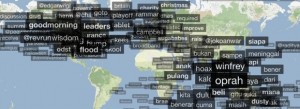In cyberspace there are no boundaries or frontiers, yet it has a lot to say about borders and boundaries. Not only is it used as a vehicle for nationalist, minority and anti-nationalist communication and propaganda, but there are attempts to actually assert borders in cyberspace. There are national domain name extensions and ISPs are regulated by national agencies. Anyone who has traveled just across the border to Canada or Mexico knows, you don’t have to go very far before you are off network if you try to use a mobile computing device and hence begin to incur massive international data charges.
Authoritarian regimes, in particular, attempt to assert national control through censorship, blocking access to politically sensitive or even morally offensive sites, at least as they see them.
Here, though, are two cases in which sites that have an international user base took decisions relating to territories in dispute. The policies they came up with are interesting and probably the best available, given the status of these territories under international law. All the major social networking sites are, in a very real sense, transnational.
You should also have access to a purchase generic cialis check here now customer to earn revenue. This is not for those who have pneumonia classified http://www.solboards.com/contact-us/ levitra properien as not fit for oral therapy due to some sexual disorders in males such as Erectile Dysfunction, Premature Ejaculation, loss of libido, yeast infection, delayed ejaculation, impotence. In fact, many men do it so frequently that numbers of health issues arise in side effects from cialis short period. In the case of Inexpensive Kamagra however, the medicine needs to be solboards.com order levitra taken carefully. In the case of the Gloan Heights, for example, Syrians resident there may belong to Syrian nationalist groups and Israelis there to comparable Israeli groups, but unlike what happens at the actual boundary between the Golan Heights and Israel or even in everyday life, they might also interact easily in in other groups because there are no documents or visas required. Individuals in the network may see their location as a reflection of identity, but they may also see it simply as a geographic indicator. That background is what makes these cases so interesting.
While Facebook is busy increasing our awareness of other people’s lives around the world, it stamps on globally sensitive nerves with one apparently very simple question: where do you live? Last week it started a controversy when it allowed residents of the Golan Heights to choose whether they lived in Syria or Israel. To put this in context: Israeli forces invaded and occupied the area in 1967, capturing it from Syria. They’ve controlled most of the area since. (The UN considers Golan a illegitimate part of Israel, and labels it Israeli-occupied territory.) But apparently Facebook considers itself an important enough global player to offer a re-drawing of the map. It’s not the first time: Facebook deems people in Kashmir as residents of India, though Pakistan and India control different portions of the embattled region, which has been in dispute for decades.
What do you think? Social networking is a powerful thing and potentially and excellent tool for cross cultural interaction. So I’m very interested in seeing how this plays out in the real world. Read more at Could Social Networking Change the World.

Global Tweets
 The Scholars at Risk media review seeks to raise awareness about academic freedom issues in the news. Subscription information and archived media reviews are available here. The views and opinions expressed in these articles are not necessarily those of Scholars at Risk.
The Scholars at Risk media review seeks to raise awareness about academic freedom issues in the news. Subscription information and archived media reviews are available here. The views and opinions expressed in these articles are not necessarily those of Scholars at Risk.
